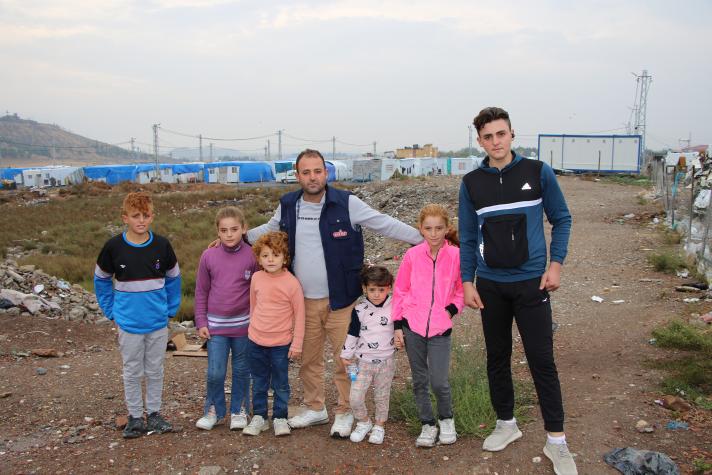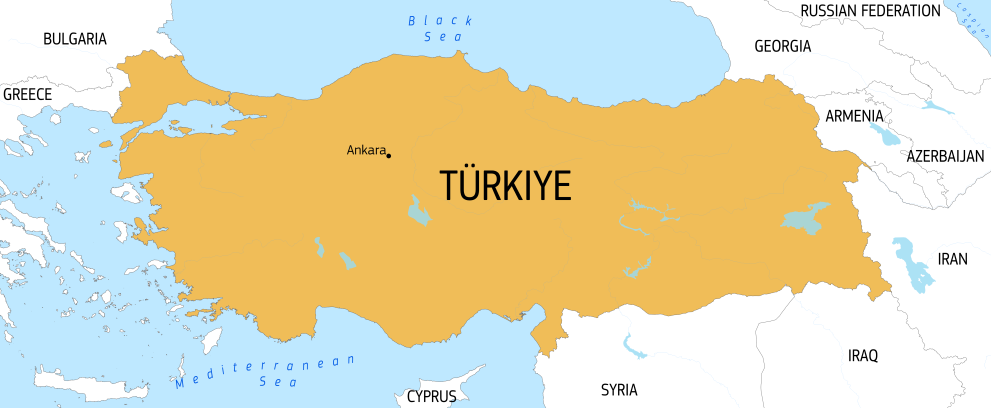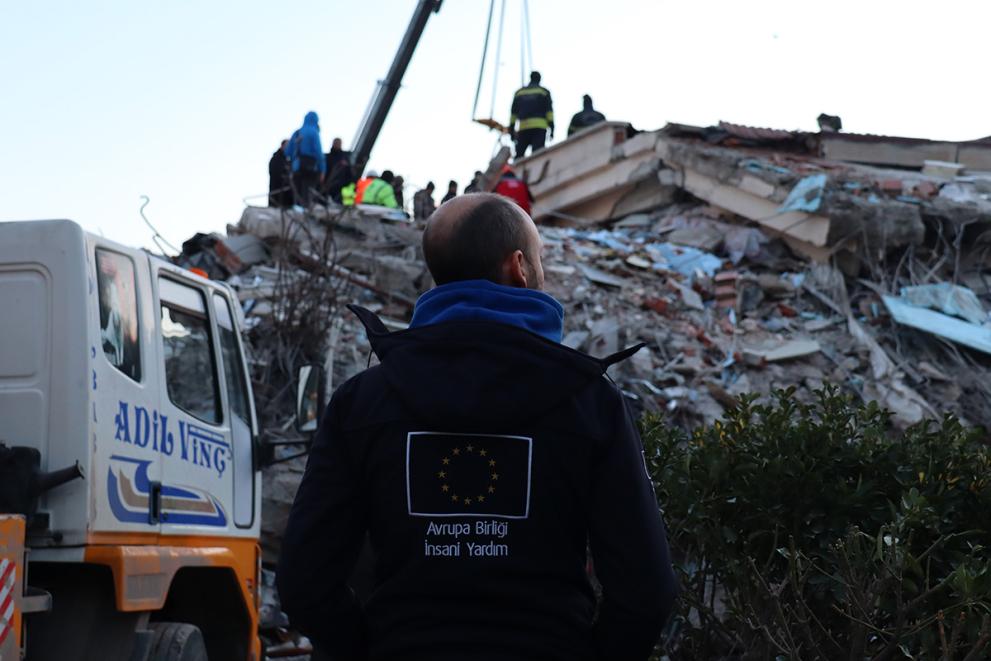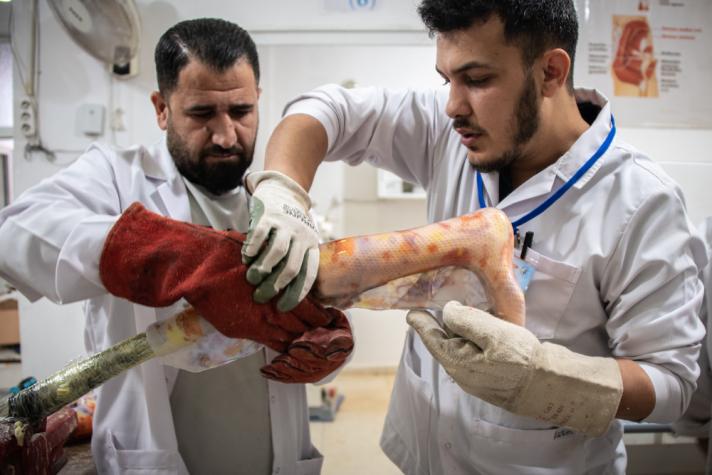Introduction
The country currently hosts the largest refugee population in the world, with close to 4 million people. Most refugees live outside camps.
While Türkiye provides registered refugees with access to basic rights and services, the skyrocketing cost of living and lack of access to income opportunities make it increasingly difficult for refugee families to get by.
In February 2023, 2 earthquakes affecting roughly 16 million people - in a radius of 500 kilometres -caused massive destruction and suffering in southeast Türkiye, creating new needs among both the Turkish and refugee populations. These events created further challenges for already vulnerable refugees.
In close cooperation with Turkish authorities, the EU continues to assist the most vulnerable people in Türkiye based on their humanitarian needs. Since 2015, the EU has supported nearly 100 humanitarian projects, contracted with over 21 partner organisations.
What are the needs?
Türkiye hosts 3.6 million Syrian refugees, who have fled the ongoing war that has been ravaging their country for 13 years. Most of them face challenging and often precarious circumstances.
The country is making efforts to provide registered refugees access to basic rights and services, including education and health care. However, the depreciation of the Turkish lira, high inflation, and the lingering socio-economic impact of COVID-19 have further worsened the already difficult living conditions of refugees.
Price increases in essential areas such as food and transportation have seriously affected the refugee population and host communities across the country.
Vulnerable people, such as the disabled, children, and the elderly have been particularly hard hit.

Some refugees feel they have no choice but to resort to negative coping mechanisms, such as child labour, street begging, or child marriage. Many families reduce their food consumption or live in substandard housing.
On 6 February 2023, 2 earthquakes of magnitudes of 7.8 and 7.5 struck Türkiye. The first was one of the most powerful earthquakes in the region in more than 100 years and struck the southeast of the country, close to the border with Syria.
The Government of Türkiye reported over 50,000 deaths, over 107,000 injured, and more than 300,000 damaged or destroyed buildings.
The humanitarian needs in the earthquake-affected areas remain high. Key priorities include:
- access to social assistance and protection for vulnerable groups, namely psychosocial support
- the rehabilitation of health and education services
- water, sanitation, and hygiene
- shelter
- protection.

How are we helping?
Earthquakes
Following the devastating earthquakes, 1,750 rescuers and 111 search dogs were immediately deployed via the EU Civil Protection Mechanism.
20 EU Member States and Montenegro offered assistance, including shelter equipment, heaters, generators, furniture, medical equipment, hygiene kits, food, and warm clothing.
Belgium, France, Germany, Italy, Spain, and Albania also deployed medical teams, including 5 field hospitals, and the Netherlands deployed a medical evacuation plane via the Mechanism.
Some 2,000 tents, 8,000 beds, and 500 relief-housing units equipped with 2,500 beds were mobilised via the rescEU reserves in Romania and Sweden.
For the immediate response to the consequences of the earthquakes, the EU mobilised €78.2 million of the EU’s humanitarian funding in Türkiye, which was delivered through the EU’s humanitarian partner organisations.

A visual story on the EU’s response to the earthquakes
In this first-hand account, find out what we did to respond to the devastating earthquakes and meet the rescue workers from across Europe who rushed to help save lives.
EU humanitarian work in the country
In close coordination with the Turkish authorities, the EU continues to fund humanitarian projects in Türkiye to provide vulnerable refugees and their host communities with the support they need. Since 2012, the EU has allocated €3.486 billion in humanitarian funding.
Since 2016, the EU’s single largest humanitarian programme in its history, the Emergency Social Safety Net (ESSN), has provided 80 months of uninterrupted cash assistance to refugees in Türkiye with a budget of more than €2.3 billion.
The last cash transfer through the ESSN to more than 1.5 million refugees was made in July 2023.
The programme has now been handed over to the EU’s Directorate-General for Neighbourhood and Enlargement Negotiations (DG NEAR), in line with the EU humanitarian-development-peace nexus approach. Refugees in Türkiye will continue to receive assistance under the EU’s new social safety net (SSN) programme.
Another positive example of the EU humanitarian-development-peace nexus approach is the transition in October 2022 of the conditional cash transfer for education to DG NEAR. This was the EU’s largest humanitarian education programme and has supported over 800,000 children since 2017.
The EU is also committed to providing access to education for refugee children. The support for school enrolment (SSE) programme aims to help over 65,000 refugee children enrol in formal and non-formal education by the end of 2024. Where necessary, children and families are also provided with transportation, translation, and further support to ensure children's enrolment in educational opportunities.

EU-funded humanitarian projects in Türkiye are addressing various protection issues, including legal counselling, psychosocial support, access to civil documentation, and access to specialised services.
In line with the recommendations of the Grand Bargain, the LIFT project (now called CLIP) was successfully established as a pool funding mechanism in 2018 in Türkiye. It supports small and medium-sized local initiatives to access international funding.
The network is now composed of 23 grassroot local NGOs active in 22 provinces across the country. The project has provided valuable support to refugees in need of humanitarian assistance in the protection sector, especially in underserved areas, reaching out the extra-mile to support underserved refugees.
The CLIP project, which was also mobilised for the earthquake response (supporting in-kind distribution and Search and Rescue teams) was mentioned as a model in the 2021 Humanitarian Aid Communication (EU’s humanitarian action: new challenges, same principles).
We are also supporting:
- continuous registration,
- identification of persons of concern (such as unaccompanied minors and gender-based violence victims),
- referrals to state institutions,
- specialised protection services including cash for protection.
Türkiye has also been a participating state of the EU Civil Protection Mechanism since 2005.
Established in 2001, the Mechanism aims to strengthen the cooperation between the EU Member States and participating states on civil protection to improve prevention, preparedness, and disaster response.
Last updated: 02/02/2024

